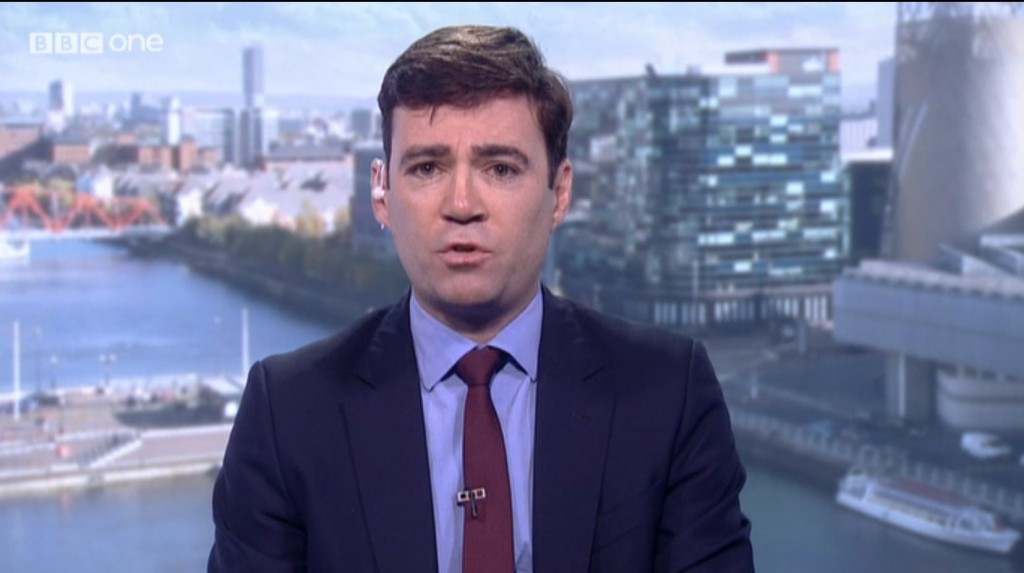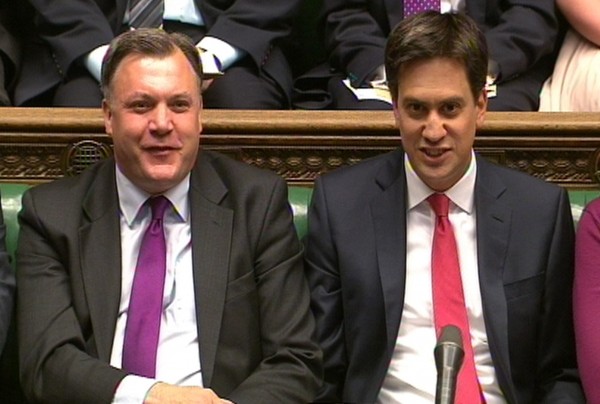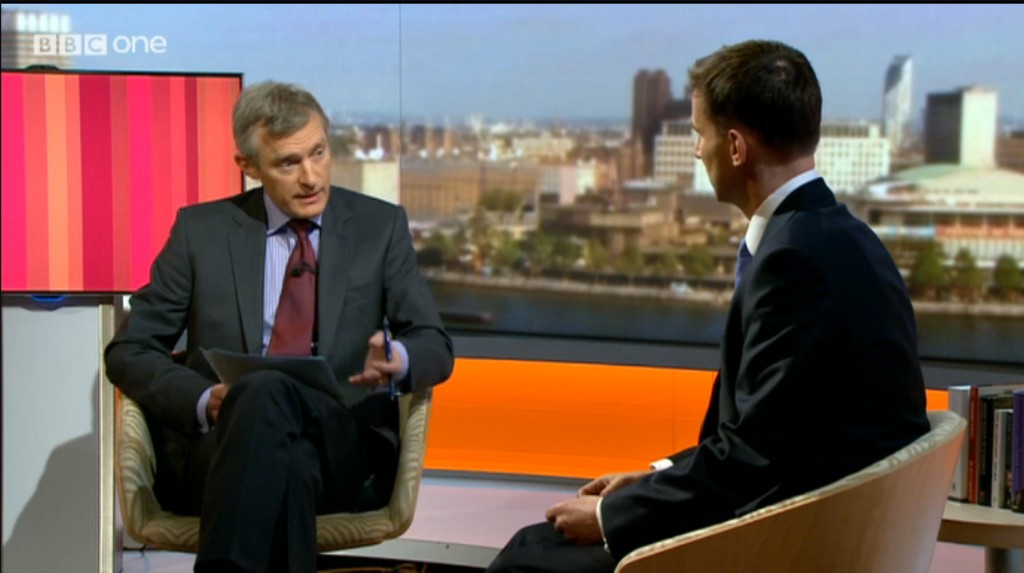Home » Posts tagged 'A&E crisis'
Tag Archives: A&E crisis
This is no time for an amateur. Burnham must become Secretary of State for Health.
Andy Burnham MP (@andyburnhammp), Shadow Secretary of State for Health, was interviewed this morning by veteran broadcaster, Andrew Neil (@afneil) on #BBCSP.
The question is how well the NHS is prepared for the winter period this time around. This is no time for an amateur. Winter staffing levels and bed capacity are going to be vital planning considerations.
According to Richard Vautrey (Deputy Chair of the BMA GPs committee), “Doctors and all healthcare professionals are hugely frustrated… The political knockabout is hugely frustrating.”
Neil asked Burnham what one move he would implement to relieve the crisis in A&E forecast for this winter.
“I would immediately halt the closure of NHS walk-in centres”, announced Burnham.
There has been much criticism over the NHS 111 ‘rolled out’ by the Coalition, and indeed Keogh this week signalled that he wished to extend the powers of NHS 111 in the next few years in a reconfiguration of A&E services.
Burnham himself has much attacked how people are not clinically trained have to stick to their algorithms, which invariably end with ‘Go to A&E!’ for difficult problems.
“I would put nurses back on the end of phones, and restore the NHS Direct-type service”.
Of course, many people in English health policy feel that the A&E problem has been exacerbated with sometimes inappropriate ‘social admissions’. Burnham cites often that the ‘whole person’ was a founding principle of the National Health Service under Bevan. Therefore it was unsurprising that he should bring up this flagship policy of Labour in this brief interview.
“I want to rethink how the NHS works – the full integration of health and social care.”
Neil then went onto explore other interesting issues currently confronting English health policy.
Should the NHS brace itself for another ‘top down reorganisation’ under Labour after May 8th 2015?
“No it shouldn’t. I will repeal the Health and Social Care Act. Moving forward, it’s all about making the current structures do different things. I will work with the health professions.”
At this point in the interview, Andy Burnham started ‘talking back’ (politely).
“Why don’t you spend time talking about £1.5bn NHS reorganisation?”
GPs have been put in the firing line by Jeremy Hunt, especially the 2004 GP contract. Accessibility to GPs has therefore become a political ‘hot potato’.
Labour has been much criticised for the ‘target driven culture’. Indeed, the political manifestos in 2010 had appeared to signal a shift from this culture. Managers being driven by targets keep on resurfacing in the news headlines; as for example, the recent furore in Colchester.
This, however, was a positive opportunity to talk about a beneficial target which had been scrapped.
“We brought in evening and weekend opening. This has been reversed too.”
“I welcome a move to bring back named GPs. But I want to be clear. It’s got harder to get a GP appointment, as the 48 hour target – which we introduced – has been scrapped.”
The Health and Social Care Act (2012) is fundamentally hinged on a competitive market and its regulation.
It is clear now, however, that competition, heavily touted by some think-tanks, has become a massively flawed plank in policy.
Referring to David Nicholson’s recent evidence in the Health Select Committee, Burnham opined, “Only last week the CEO of the NHS is bogged down in a ‘morasse of competition law”.”
Furthermore Burnham signalled that he welcomed a right for patients to come under GPs outside of their catchment area, as he had indeed promised before the last election.
On the general issue of how GPs are performing, Burnham added quickly, “I think every political party supports transparency.”
This week is likely see a number of proposals from the current Government in response to the latest Francis report about Mid Staffs, which had really put patient safety in the NHS into the public spotlight.
“‘Wilful neglect’ was a recommendation of the Francis Report. You can’t ‘pick and mix’ the recommendations. It is an entire package. It must be implemented in full. This includes safe staffing levels. The Government has a responsibility to staff as well.”
Is the GPs Contract of 2004 to blame? ‘Our survey’ of Stephen Dorrell and Alan Milburn “say no”.
Milburn even called it ‘nonsense’, saying though he felt Jeremy Hunt’s “pain”.
“[The Contract] got changed every year from 2004. There are a lot of myths which have built up around the contract. The 2004 Contract was responsible for the A&E crisis is just spin of the worst kind.”
Then veteran broadcaster Neil started talking about other issues.
“I can’t believe you’re talking about those emails on a national programme. You’re really scraping the barrel.”
They both chuckled and ended the brief interview.
This is no time for an amateur.
He may drive the Tories “nuts”, but yesterday was a virtuoso interview from Burnham.
Andy Burnham MP must become the Secretary State of Health.
You can’t trust David Cameron with the NHS
This afternoon at just after midday, David Cameron clashed with Ed Miliband over the impending A&E crisis.
The Labour Party have issued a broadcast as follows:
One of the exchanges was particularly revealing – also in demonstrating that David Cameron doesn’t know the brief well of an important contemporary issue in English health policy.
The exchange has been reported in Hansard today as follows:
Edward Miliband:The Prime Minister is giving P45s to nurses and six-figure payoffs to managers. Can he tell us how many of the people who have been let go from the NHS have been fired, paid off and then re-hired?
The Prime Minister:First, we are saving £4.5 billion by reducing the number of managers in our NHS. For the first time, anyone re-employed has to pay back part of the money they were given. That never happened under Labour. We do not have to remember Labour’s past record, because we can look at its record in Wales, where it has been running the health service. It cut the budget by 8.5%, it has not met a cancer target since 2008, and it has not met an A and E target since 2009. The fact is that the right hon. Gentleman is too weak to stand up to the poor management of the NHS in Wales, just as he is too weak to sack his shadow Health Secretary.
Edward Miliband:And we have a Prime Minister too clueless to know the facts about the NHS. Let us give him the answer, shall we? The answer is that over 2,000 people have been made redundant—[Interruption.] The hon. Gentleman says it is rubbish; it is absolutely true—we have a parliamentary answer from one of the Health Ministers. Two thousand people have been made redundant and re-hired, diverting money from the front line as this Prime Minister sacks nurses. [Interruption.] The Prime Minister seems to be saying it is untrue; well, if he replies he can tell me whether it is untrue. We know why the NHS is failing: his botched reorganisation, the abolition of NHS Direct, cuts to social care, and 6,000 fewer nurses. There is only one person responsible for the A and E crisis, and that is him.
Unknown to Cameron, @andyburnhammp had asked exactly the same question as @Ed_Miliband asked in #pmqs and got a reply.
The reference for this Q/A is: http://bit.ly/1ejPr3Q
Andy Burnham: To ask the Secretary of State for Health how many NHS staff have been made redundant and subsequently re-employed by NHS organisations on a (a) permanent basis and (b) fixed-term contract basis since May 2010. [147768]
Dr Poulter: The number of NHS staff made redundant in the NHS since 1 May 2010 and subsequently re-employed by NHS organisations on a (a) permanent basis is estimated to be 1,300 and (b) fixed-term contract basis is estimated to be 900.
These estimates are based on staff recorded on the Electronic Staff Record (ESR) Data Warehouse as having a reason for leaving as either voluntary or compulsory redundancy between 1 May 2010 and 30 September 2012, and who have a subsequent record on the ESR Data Warehouse up to 30 November 2012.
In April 2010 there were 42,515 full-time equivalent (FTE) managers. Between April 2010 and November 2012 this figure has reduced by 6,905 to 35,610 FTE.
The ESR Data Warehouse is a monthly snapshot of the live ESR system. This is the HR and payroll system that covers all NHS employees other than those working in General Practice, Moorfields Eye Hospital NHS Foundation Trust and Chesterfield Royal Hospital NHS Foundation Trust, and some NHS staff who have transferred to local authorities and social enterprises.
Thanks to @DrEoinCl for finding this.
On the sensitive issue of how many people who had been made redundant were later appointed by the NHS, which David Nicholson was asked about yesterday, David Cameron attempted a bluster with no real avail.
Jeremy Hunt says that ‘NHS 111′ is now “up-and-running”, but that targets should not be gamed
The reality is that the vast majority of hospitals in the NHS are currently failing to see 95% of patients within four hours. Jeremy Hunt was interviewed on the BBC ‘The Andrew Marr Show’ this morning in a wideranging interview which also covered membership of the European Union.
Jeremy Hunt first underplayed the severity of the NHS 111 fiasco, but claimed that things are better now. Of course, one tragedy in care is one too many. The NHS says it has experienced seven “potentially serious” incidents in the first few weeks of its 111 urgent care helpline in England. One case involved a patient in the West Midlands who died unexpectedly and there have been reports of calls going unanswered and poor advice being given. All the cases are being reviewed. Other organisations are also running 111 lines for NHS England and have been warned they must deliver good care or face financial or contract penalties.
In 2010, critics had claimed the change from NHS Direct to NHS 1111 would undermine the quality of the service by reducing the number of qualified nurses answering calls, but chief executive of NHS Direct Nick Chapman said that new helpline would be better and more cost effective.
Jeremy Hunt, meanwhile, this morning stated, “There are short-term pressures and long-term pressures. We did have teething problems with NHS 111. It is up-and-running now in 90% of the country. We need to have better alternatives in primary care, a better personal relationship between patients and their GPs”.
“Under the last government, we had a culture of ‘hitting targets at any cost’.” Hunt then went onto blame ‘the target culture’ for bringing about the problems which Mid Staffordshire NHS Foundation Trust had faced, leading to two inquiries by Sir Robert Francis QC.
Hunt further added that, “I would never blame GPs, because they work extremely hard. I have just been in one.”
Of course, nobody reasonable, seriously, would take the blindest bit of difference of Hunt comparing his brief time work experiencing in a GP surgery to seven years of basic medical training, including pre-registration training, even prior to specialist GP training.
GPs have experienced a number of contractual changes over time (described here), and latterly it has been mooted that the personal income of GPs, following the latest change, has been steadily eroded as funding levels have been frozen, whilst the running costs of surgeries and staff pay have increased.
Hunt further provided this morning, “That Contract is one of the contributing causes, because after hours and at weekends the service deteriorates. I don’t want to go back to those days where GPs are personally on call at 2 am.”
Hunt added that, “GPs should have responsibility that people on their list have a good service.”
It is difficult to see what exactly Hunt means by this, as it is hard to separate out the effect of a medical decision taken out-of-hours compared to a decision compared to during ‘conventional hours’, and one assumes that each Doctor is still responsible for his/her own medical actions to the General Medical Council, wherever he or she provides care.
Hunt then gave a response which managed to combine a welcome for targets in improving care, with direct criticism of those managers clearly gaming the system.
Regarding the A&E target, Hunt opined, “It is a very important target, and we have never said we do not have to have good targets. We don’t want people to follow targets at any cost.” However, he then described a series of measures how managers would then ‘game’ the system.
“We had beds which hadn’t been cleaned, ambulances circling hospitals before they entered the front door because they didn’t want the clock the start.”



